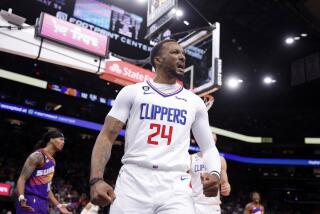Understanding Powell Mania
- Share via
Before the Gulf War, I had never heard of the man. Of course, I’m not a follower of the military world. But I remember my blood curdling when, during a press briefing, Gen. Colin L. Powell outlined the U.S. military strategy for addressing the threat of the Iraqi army by coldly stating, “We’re going to kill it.”
For the past year, this country has been in the midst of Powell mania. If one is to listen to the glowing words from many middle-aged white men, and in particular leaders of the Republican Party, the political future of the former chairman of the Joint Chiefs of Staff has taken on the importance of the Second Coming.
I don’t know enough about Powell’s politics to formulate a concise picture of who he really is, though I’m deeply touched by his support of affirmative action, education and the right of a woman to choose on abortion. Just his commitment to these ideas says to me that at the very least, he is a man of deep honesty.
Still, none of this explains the frequency with which Powell’s name is bandied about. I am particularly perplexed when one considers that the Rev. Jesse Jackson’s message, though more fervently expressed, echoes many of same sentiments. Yet Jackson is treated like a political pariah by the white left, right, middle, top and bottom.
If I am to believe what I hear from Republican leadership, getting Powell on board with presumptive nominee Bob Dole would transform an ineffectual political campaign into a full-scale crusade. A secondary part of this political premise is that Powell’s alignment in just about any role in a Dole administration would galvanize the docile, dim-witted African American community to come in from yonder.
Black folks, on the other side, seem to be indifferent about a Powell candidacy. Most are impressed with the general’s accomplishments, but they acknowledge the contradictions he must have faced leading a war that did little to advance the freedom of the brothers and sisters at home. And there is the small detail that he was missing in action when many of the major civil rights battles of his generation were waged. This is not to dismiss the fact that he has a contribution to make, but who and what he represents is not yet clear.
So what is beneath the Powell mystique and the white political structure’s attraction to him? I think the answer is deeply embedded in the white American psyche. In the final analysis, Powell represents for some “the good Negro.” A lot of this is based on his measured demeanor when he speaks in rational, unemotional tones. He never slips into the rhythmic, Messianic cadences of a Jackson, a Kweisi Mfume or all those Southern ministers whose churches were torched.
Rather, Powell’s ability to purchase a country squire home in McLean, Va., represents the kind of black neighbor desired in any respectable suburban neighborhood. He won’t play his rap music too loud, allow his children to wear baggy pants or fraternize with the sort of people who wouldn’t qualify for high-paying professional jobs.
Powell has gone on record supporting Dole and there is a lot of debate about whether he will be a principal speaker at the San Diego convention. Whatever happens, Powell will continue to be courted by powerful white political structure, and if he remains true to his beliefs, he’ll probably continue to speak the truth.
So Powell’s real importance may be his “bilingual” status--his ability to keep the dialogue open between two dissimilar communities. Still, the white leadership’s celebration of Powell is a disquieting acknowledgment of their inability to accept the larger, undiluted African American community.
More to Read
Get the L.A. Times Politics newsletter
Deeply reported insights into legislation, politics and policy from Sacramento, Washington and beyond. In your inbox twice per week.
You may occasionally receive promotional content from the Los Angeles Times.










